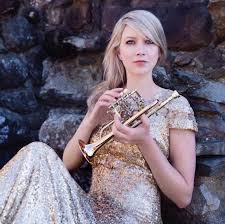by Daniel Hathaway
Saturday’s agenda includes three orchestra concerts: the Akron Symphony (7:30 at E.J. Thomas with trumpet soloist Mary Elizabeth Bowden, pictured), Firelands Symphony & Chorale with the Heidelberg Concert Choir (7:30 at Trinity UCC in Tiffin), and The Cleveland Orchestra with guest conductor John Adams, organist James McVinnie & saxophonist Timothy McAllister (8 pm at Severance Center), as well as a Cleveland Uncommon Sound Project program by Binary Canary (8 pm at Convivium 33 Gallery).
On Sunday, CIM repeats its Pocket Full of Operas (3 pm in Mixon Hall), Euclid Symphony features Young Artists Competition winner, pianist Louis Wang (3 pm at Shore Cultural Center), the Suburban Symphony hosts duo-pianists Antonio Pompa-Baldi and Emanuela Friscioni (3:30 pm at the Maltz), Firelands Symphony repeats its Saturday program (4 pm at St. Mary’s, Sandusky), and Oberlin Conservatory anticipates Monday’s solar event with a world premiere and other works with an eclipse theme (7:30 in Warner Concert Hall).
ANNOUNCEMENTS:
Under the headline “Chicago Symphony Picks You Know Who,” Musical America wrote on Friday, “In what may have been the worst-kept secret about the world’s youngest, most oversubscribed music director, the Chicago Symphony Orchestra announced 28-year-old Finnish conductor Klaus Mäkelä as successor to Riccardo Muti.”
Read the article by Susan Elliott here, and an April 5th New York Times critic’s notebook reflection by Zachary Woolfe here. Cleveland Orchestra audiences will next have the opportunity to watch Mäkelä in action at Severance Music Center on the weekends of April 11-13 and April 18-20.
On Friday, Tuesday Musical announced its 2024-2025 series, which includes “A big band tribute to an American legend, a world-famous orchestra, and a unique celebration for Akron’s 200th birthday.” See the season lineup here.
WEEKEND ALMANAC:
April 6:
French-American harpist and composer Carlos Salzedo was born in 1885 in Arcachon (official name, Charles Moïse Léon Salzedo).
Salzedo single-handedly created the role of the modern virtuoso concert harpist, establishing a summer harp colony in Camden, Maine, founding the harp department at the Curtis Institute of Music, and teaching at the Juilliard School. Listen to the master himself playing his Variations on a Theme in Ancient Style, to a performance of his Scintillation by Yolanda Kondonassis, and to his Steel as played by the Salzedo Harp Duo (Nancy Lendrim and Jody Guinn) on the April 11, 2018 Brownbag Concert at Trinity Cathedral.
April 7 — by Jarrett Hoffman:
This date in 1920 saw the birth of Indian sitar player and composer Ravi Shankar who is famous for igniting a passion in the West for classical Indian music. “If I’ve accomplished anything in these past 30 years,” he told The New York Times in 1985, “it’s that I have been able to open the door to our music in the West. I enjoy seeing other Indian musicians — old and young — coming to Europe and America and having some success. I’m happy to have contributed to that.”
He also acknowledged the cultural challenges that came along with that, noting that in the next generation, interest in India was being fueled in part by Western films and television shows. “What we have to do now is convey to them an awareness of the richness and diversity of our culture.”
A similar contrast of emotions can be seen in his rise to pop culture celebrity. According to his December 2012 obituary written by Allan Kozinn in The Times, “At first Mr. Shankar reveled in the attention…and he performed for huge audiences at the Monterey International Pop Festival in 1967 and at Woodstock in 1969…[But he] came to regard his participation in rock festivals as a mistake, saying he deplored the use of his music, with its roots in an ancient spiritual tradition, as a backdrop for drug use.” He was also displeased about his music being treated as a fad, “something that is very common in Western countries,” he said.
Here are two different ways (out of many) to revisit or delve into Shankar’s music. First, his 1990 album Passages, co-composed with Philip Glass — a compelling mixture of Hindustani classical music and minimalism. Second, moving more in the traditional direction, a live performance in London with one of his favorite collaborators, Alla Rakha on tabla.




